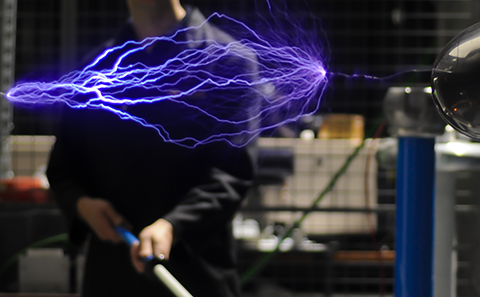
Electrical Engineering
Our degrees take you from novel super conducting systems to the principles of power generation and transmission. Find out more.
The growth of the renewable energy sector has led to a shortage of qualified electrical engineers, meaning our graduates have excellent career prospects. If you have an interest in developing a smarter, greener and more secure electric power grid or dealing with the challenges of the electrification of transport, this could be the career for you. Study at the University of Southampton and gain the skills to run and monitor large-scale energy distribution systems and to design next-generation electrical materials and components.
Learn more about our BEng Electrical Engineering degree
Our degrees take you from novel super conducting systems to the principles of power generation and transmission. Find out more.
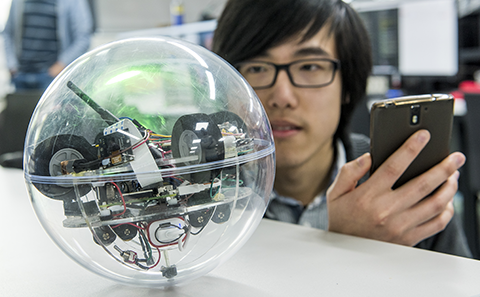
Study across the spectrum of electrical and electronic engineering and gain the skills to solve some of todays biggest engineering challenges. Find out more.
The growth of the renewable energy sector has led to a shortage of qualified electrical engineers, meaning our graduates have excellent career prospects. If you have an interest in developing a smarter, greener and more secure electric power grid or dealing with the challenges of the electrification of transport, this could be the career for you. Study at the University of Southampton and gain the skills to run and monitor large-scale energy distribution systems and to design next-generation electrical materials and components.
Learn more about our BEng Electrical Engineering degreeResearchers across Engineering and Physical Sciences will address global challenges in four new Centres of Excellence at the University of Southampton.
Academics in Electronics and Computer Science will play an integral role in each of the four cross-disciplinary centres that focus on spearheading sustainable digital technologies.
The new Centres will tap into the University’s diverse strengths to deliver major research programmes in Continuous Digital Chemical Engineering Science, the Future of Human Communication, In-situ and Remote Intelligent Sensing, and Re-engineering for Electric Mobility.
Professor Bashir Al-Hashimi, Dean of Faculty, Engineering and Physical Sciences, says: “I am delighted to be formally launching these new hubs that will push the frontiers of research. This cross-disciplinary approach will channel expertise, both within and beyond our Faculty, and I firmly believe this will generate exceptional real-world impact.”
The Centre for Continuous Digital Chemical Engineering Science will develop smarter, greener and more efficient processes for the discovery and manufacture of new chemicals and materials. It aims to reduce the environmental footprint of chemicals and materials manufacture and open up new possibilities for industrial product development and scientific research.
The Centre for the Future of Human Communication is dedicated to developing digital technologies that will help people to communicate better. Its researchers are working on accessible devices and systems to improve the healthcare and wellbeing, and enhance the way we learn, work and consume entertainment and culture.
The Centre for In-situ and Remote Intelligent Sensing is the world’s only research hub dedicated to developing intelligent, connected, self-powered sensing systems. Operating in some of Earth’s most remote, harsh environments, they will provide better understanding of the world around us and help tackle pressing environmental and human challenges.
The Centre for Re-engineering for Electric Mobility will accelerate the development of sustainable, interconnected electric transport systems, re-engineering existing infrastructure and vehicles through advances in energy storage technology, the use of digital tribology to optimise components, and the redesign of the human-machine interface.
Professor Robert Wood, Associate Dean of Faculty (Research), Engineering and Physical Sciences, says: “Through these connected discipline centres we aim to transform the research landscape, connect to global and national challenges and drive research areas aligned to societal needs.
“We are very pleased to have received declarations of interest from dozens of researchers, including our vibrant early career research community, and these hubs will now begin to connect to the University Strategic Research Groups, University institutes and our industrial partners to launch ambitious programmes that will change the world for the better.”
Further information about the Centres and other activities within Engineering and Physical Sciences can be found on the Faculty’s webpage.
A rapid prototyping service for photonic integrated circuits is being expanded in a new funding success at the University of Southampton's £120m cleanroom complex.
Research partners, including experts from Electronics and Computer Science's Sustainable Electronic Technologies group, have been awarded around £1.5m by the Engineering and Physical Sciences Research Council (EPSRC) to extend the CORNERSTONE service.
CORNERSTONE is an industry compatible, flexible silicon photonics fabrication foundry that provides a multi-project-wafer (MPW) service for academics and industry. The scalable platform, which is unique in its design and process versatility, offers a clear route to market through the use of deep ultraviolet projection lithography.
The team will now develop six new silicon-based technology platforms for researchers to design next generation circuits. These platforms will extend the supported wavelength range into both the visible wavelengths and mid-infrared wavelengths, enabling a range of applications including LIDAR remote sensing and lab-on-a-chip devices.
Professor Harold Chong, Project Co-Investigator and Professor of Electronic Engineering, said: “The flexibility of the processes and the variety of the platforms available in CORNERSTONE 2 gives researchers numerous options when designing optoelectronics devices and systems.
The service is led by Southampton researchers from the Zepler Institute for Photonics and Nanoelectronics' Silicon Photonics Group and School of Electronics and Computer Science, alongside external partners from the University of Glasgow. The Glasgow team will be responsible for integrating light sources onto silicon photonics chips, a major step in the commercialisation of silicon photonics.
Professor Graham Reed, Project Principal Investigator and Deputy Director of the University's Optoelectronics Research Centre, said: "I'm delighted that the EPSRC are supporting the expansion of CORNERSTONE. I believe that it will enable UK researchers to have significant impact in a variety of silicon-based platforms."
The project officially launches on Sunday 1 March and will run for two years.
UK academics will have the opportunity to access the new platforms free-of-charge for the final six months of the project. Throughout the CORNERSTONE 2 project, the team will be consulting the community to determine if they would like to see CORNERSTONE become an EPSRC National Research Facility (NRF).
For more information, visit the CORNERSTONE website.
Autonomous vessel mission capability is being increased by a new software package developed in a strategic partnership between the University of Southampton and Thales.
The Integrated Mission Management System (IMMS) project, which brings together experts from Engineering and Electronics & Computer Science, is addressing current limitations around autonomous vessels that require one human controller per vehicle.
IMMS scales up the potential for autonomous squads by providing a common interface that connects vessels and their payloads with a single human supervisor.
The joint team, led by the University's Dr Jon Downes and Thales' Ben Pritchard, successfully tested the software package this winter with a three-vessel trial at Thales' Maritime Autonomy Centre on the Plymouth waterfront.
The first year of the university-industry strategic research partnership was recently celebrated at an event on Boldrewood Innovation Campus.
Thales has also supported an Alan Turing Institute project, Flexible Autonomy for Swarm Robotics, led by Professor Sarvapali Ramchurn from the Agents, Interaction and Complexity Research Group.
Read the full story on the main news page.
Discover our range of research programmes
Choose the one to match your interest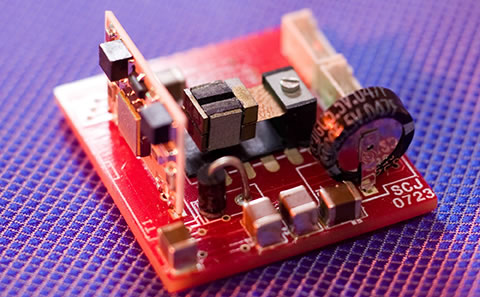
The Faculty Recruitment & Admissions Office receives about 1000 enquiries regarding PhD admissions every year
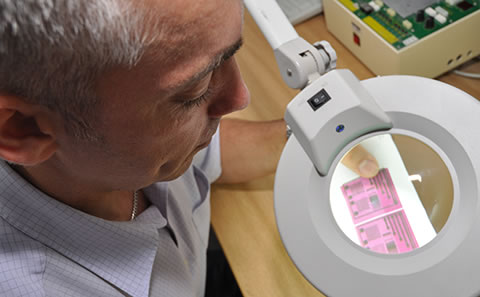
Electronics and Computer Science (ECS) is the leading university department of its kind in the UK

We would like to encourage you to make your application to us on-line

As a PhD student you will need to pay annual tuition fees to the University but there are various ways you could secure funding to cover these costs
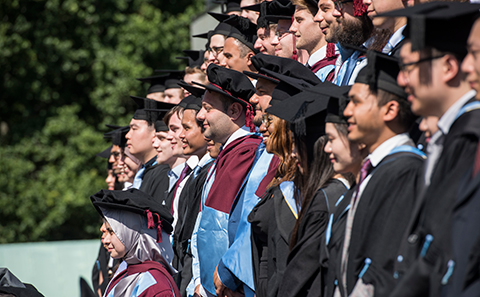
The Graduate School in Electronics and Computer Science aims to support you throughout your time undertaking PhD research
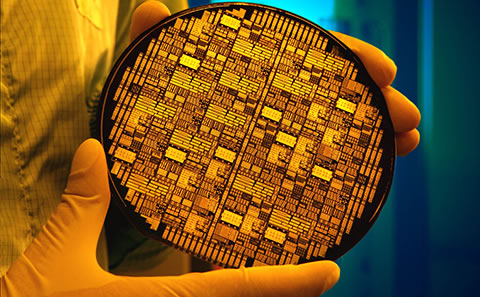
Centre for Doctoral Training in Machine Intelligence for Nano-Electronic Devices and Systems
Discover our range of research programmes
Choose the one to match your interestI am an Associate Professor in the School of Electronics & Computer Science at the University of Southampton. I received the MS and Ph.D degrees in electronic and electrical engineering from Yonsei University, Seoul, Korea, in 2001 and 2005, respectively. I was employed as a researcher of Knowledge Science Lab (KSL) at Advanced Telecommunications Research Institute International (ATR), Japan, from 2005 to 2008, and as a senior research fellow (RA-2) at the Centre for Vision, Speech, and Signal Processing (CVSSP) at the University of Surrey, UK, from 2008 to 2020.
I was involved in EU FP7 IMPART project for multi-modal big data processing as a work package leader in 2012-2015. I lead the computer vision team in the UK EPSRC project - S3A: Future Spatial Audio (2013-2019). I also served as a Principal Investigator for BEIS Global Partnership programme - Intelligent Virtual Reality: Deep Audio-Visual Representation Learning for Multimedia Perception and Reproduction (2017-2019). Currently I'm serving as the Principal Investigator for three projects: IfLS COMFY project to develope a contactless mask fit-testing system (2021-2022), EPSRC NIA project for Immersive Audio-Visual 3D Scene Reproduction (2021-2024) and Real-time 3D scene understanding and human pose estimation (2022-2023).
PhD opportunities: I am looking for strong, highly-motivated PhD students to work on 3D computer vision.
My researches for last 20 years include 3D computer vision, Stereo image processing, 3D reconstruction, Augmented/Virtual Reality, Multi-modal data processing, Audio-visual data processing and Media production with over 100 published articles in 16 projects.
COMP6223 Computer Vision, COMP1201 Algorithmics
PhD Alumni: Dr. Armin Mustafa (Univ. of Surrey), Dr. Sam Fowler (Univ. of Surrey), Dr. Matt Shere (Univ. of Surrey)
PhD Alumni (Partial/Visiting): Dr. Shishido Hidehiko (Univ. of Tskuba, Japan), Dr. Changjae Oh (Yonsei University, South Korea), Dr. Aloisio Dourado (Univ. of Brasilia)
PhD supervision (current): Mr. Yihong Wu (2020-), Mr. Yuwen Heng (2020-), Mr. Peter Hardy (2020-), Ms Mona Alawadh (2021-), Mr Sepehr Nem (2021-) , Mr Kieran Maguire (2021-)
Remaggi, L., Kim, H., Jackson, P.J.B., Fazi, F.M. and Hilton, Adrian (2018) Acoustic reflector localization and classification. In 2018 IEEE International Conference on Acoustics, Speech and Signal Processing (ICASSP). IEEE. pp. 201-205 . (doi:10.1109/ICASSP.2018.8462146).
Woodcock, James, Francombe, Jon, Franck, A., Coleman, P., Hughes, R., Kim, H., Liu, Q., Menzies, D., Simón Gálvez, M.F., Tang, Y., Brookes, T., Davies, W.J., Fazenda, B.M., Mason, R., Cox, T.J., Fazi, F.M., Jackson, P.J.B., Pike, C. and Hilton, A. (2018) A framework for intelligent metadata adaptation in object-based audio. Audio Engineering Society Conference on Spatial Reproduction, , Tokyo, Japan. 06 - 09 Aug 2018. pp. 349-359 .
Kim, Hansung, Pabst, Simon, Sneddon, Justin, Waine, Ted, Clifford, Jeff and Hilton, Adrian (2015) Multi-modal big-data management for film production. 2015 IEEE International Conference on Image Processing, , Quebec City, Canada. 27 - 30 Sep 2015. pp. 4833-4837 . (doi:10.1109/ICIP.2015.7351725).
Mustafa, Armin, Kim, Hansung, Guillemaut, Jean-Yves and Hilton, Adrian (2015) General dynamic scene reconstruction from multiple view video. 2015 IEEE International Conference on Computer Vision, , Santiago, Chile. 07 - 13 Dec 2015. pp. 900-908 . (doi:10.1109/ICCV.2015.109).
Mustafa, Armin, Kim, Hansung, Guillemaut, Jean-Yves and Hilton, Adrian (2016) Temporally coherent 4D reconstruction of complex dynamic scenes. In 2016 IEEE Conference on Computer Vision and Pattern Recognition (CVPR). IEEE. pp. 4660-4669 . (doi:10.1109/CVPR.2016.504).
Kim, Hansung, Evans, Alun, Blat, Josep and Hilton, Adrian (2018) Multimodal visual data registration for web-based visualization in media production. IEEE Transactions on Circuits and Systems for Video Technology, 28 (4), 863 - 877. (doi:10.1109/TCSVT.2016.2642825).
Kim, Hansung, Remaggi, Luca, Jackson, Philip J.B. and Hilton, Adrian (2019) Immersive spatial audio reproduction for VR/AR using room acoustic modelling from 360 images. In 2019 IEEE Conference on Virtual Reality and 3D User Interfaces (VR). IEEE. pp. 120-126 . (doi:10.1109/VR.2019.8798247).
Mustafa, Armin, Kim, Hansung and Hilton, Adrian (2019) MSFD: Multi-scale segmentation based feature detection for wide-baseline scene reconstruction. IEEE Transactions on Image Processing, 28 (3), 1118-1132. (doi:10.1109/TIP.2018.2872906).
Oh, Changjae, Ham, Beomsup, Kim, Hansung, Hilton, Adrian and Sohn, Kwanghoon (2019) OCEAN: Object-centric arranging network for self-supervised visual representations learning. Expert Systems with Applications, 125, 218-292. (doi:10.1016/j.eswa.2019.01.073).
Kim, H., Yang, S.-J. and Sohn, K. (2003) 3D reconstruction of stereo images for interaction between real and virtual worlds. ACM International Symposium on Mixed and Augmented Reality. pp. 169-176 . (doi:10.1109/ISMAR.2003.1240700).
Kim, H. and Sohn, K. (2003) Hierarchical depth estimation for image synthesis in mixed reality. Woods, Andrew J., Merritt, John O., Benton, Stephen A. and Bolas, Mark T. (eds.) In Stereoscopic Displays and Virtual Reality Systems X. SPIE. pp. 544-553 . (doi:10.1117/12.473879).
Kim, H. and Sohn, K. (2003) Hierarchical disparity estimation with energy-based regularization. IEEE International Conference on Image Processing. pp. 373-376 . (doi:10.1109/ICIP.2003.1246976).
Kim, H., Choe, Y. and Sohn, K. (2004) Disparity estimation using a region-dividing technique and energy-based regularization. Optical Engineering, 43 (8), 1882-1890. (doi:10.1117/1.1766299).
Kim, H., Kitahara, I., Kogure, K., Hagita, N. and Sohn, K. (2004) Sat-cam: personal satellite virtual camera (Lecture Notes in Computer Science, 3333), vol. 3333, Springer, 8pp.
Min, D., Kim, H., Choi, S. and Sohn, K. (2006) Edge-preserving joint motion disparity estimation in stereo image sequences. Signal Processing: Image Communication, 21 (3), 471-476. (doi:10.1016/j.image.2005.10.003).
Kim, H. and Sohn, K. (2005) 3D reconstruction from stereo images for interactions between real and virtual objects. Signal Processing: Image Communication, 20 (1), 61-75. (doi:10.1016/j.image.2004.10.004).
Kim, H., Min, D., Choi, S., Kim, D. and Sohn, K. (2005) Real-time shape recovery from silhouette and disparity. ACM SIGGRAPH. (doi:10.1145/1186954.1187027).
Kim, H., Choi, S. and Sohn, K. (2005) Real-time depth reconstruction from stereo sequences. Javidi, Bahram, Okano, Fumio and Son, Jung-Young (eds.) In Three-Dimensional TV, Video, and Display IV. SPIE.. (doi:10.1117/12.630397).
Kim, H., Min, D.B. and Sohn, K. (2005) Real-time stereo using foreground segmentation and hierarchical disparity estimation (Lecture Notes in Computer Science, 3767, 3767), vol. 3767, Springer-Verlag Lecture Notes in Computer Science, 12pp.
Kim, H., Min, D.B., Choi, S. and Sohn, K. (2006) Real-time disparity estimation using foreground segmentation for stereo sequences. Optical Engineering, 45 (3), [037402]. (doi:10.1117/1.2183667).
Jeon, H, Shin, S.Y., Bae, J.S., Kim, Hansung, Lim, J. and Sohn, Kwanghoon (1999) A new laser beam scanning method for 3D display systems using curvature-compensated tapered-cylindrical mirror. 3D Image Conference. 22 Jul 1999.
Kim, Hansung, Kim, S, Son, Jungyoung and Sohn, Kwanghoon (2001) Feature-based disparity estimation for intermediate view reconstruction of multiview images. International Conference on Imaging Science, Systems and Technology. 07 Jun 2001.
Kim, Y., Kim, Hansung, Cho, S., Lee, J. and Sohn, Kwanghoon (2002) Stereo image compression using object-based disparity estimation and compression. International Workshop on Advanced Image Technology. 16 Jan 2002.
Kim, Hansung, Kitahara, I., Kogure, K., Hagita, N. and Sohn, Kwanghoon (2004) Sat-Cam: personal satellite virtual camera. Pacific Rim Conference on Multimedia. 17 Nov 2004.
Kim, H., Kitahara, I., Kogure, K. and Sohn, K. (2006) A real-time 3D modeling system using multiple stereo cameras for free-viewpoint video generation. Campilho, Aurélio and Kamel, Mohamed (eds.) In Image Analysis and Recognition. vol. 4142, Springer-Verlag Lecture Notes in Computer Science. pp. 237-249 . (doi:10.1007/11867661_22).
Kim, H., Kitahara, I., Sakamoto, R. and Kogure, K. (2006) An immersive free-viewpoint video system using multiple outer/inner cameras. 3DPVT. pp. 782-789 . (doi:10.1109/3DPVT.2006.27).
Kim, H., Sakamoto, R., Kitahara, I. and Kogure, K. (2006) From inside and outside: immersive 3D video generation. ACM SIGGRAPH. (doi:10.1145/1179622.1179797).
Kim, H., Sakamoto, R., Kitahara, I. and Kogure, K. (2006) Cinematized reality: cinematographic 3D video system for daily life using multiple outer/inner cameras. IEEE Conference on Computer Vision and Pattern Recognition Workshop (CVPRW'06), New York, NY. (doi:10.1109/CVPRW.2006.53).
Kim, H., Sakamoto, R., Kitahara, I., Orman, N., Toriyama, T. and Kogure, K. (2007) Compensated visual hull for defective segmentation and occlusion. 17th International Conference on Artificial Reality and Telexistence (ICAT 2007), , Esbjerg, Jylland, Denmark. 28 - 30 Nov 2007. pp. 210-217 . (doi:10.1109/ICAT.2007.23).
Kim, H., Sakamoto, R., Kitahara, I., Toriyama, T. and Kogure, K. (2007) Reliability-based 3D reconstruction in real environment. ACM International Multimedia Conference and Exhibition. pp. 257-260 . (doi:10.1145/1291233.1291286).
Kim, H., Sakamoto, R., Kitahara, I., Toriyama, T. and Kogure, K. (2007) Robust foreground extraction technique using Gaussian Family model and multiple thresholds (Lecture Notes in Computer Science, 4843), vol. 4843, 11pp.
Kim, H., Sakamoto, R., Kitahara, I., Toriyama, T. and Kogure, K. (2007) Robust foreground extraction technique using background subtraction with multiple thresholds. Optical Engineering, 46 (9), [097004]. (doi:10.1117/1.2779022).
Kim, H., Sakamoto, R., Kitahara, I., Toriyama, T. and Kogure, K. (2007) 3D video system for capturing unexpected moments in daily life. In, Javidi, Bahram, Okano, Fumio and Son, Jung-Young (eds.) Three-Dimensional TV, Video, and Display VI. (Proceedings of SPIE, 6778) SPIE (11/06/07) SPIE. (doi:10.1117/12.733425).
Kim, H., Sakamoto, R., Kitahara, I., Toriyama, T. and Kogure, K. (2007) Vitual camera control system for cinematographic 3D video rendering. 3DTV-CON. (doi:10.1109/3DTV.2007.4379412).
Kim, H., Kim, D., Min, D. and Sohn, K. (2008) A 3D modeling and free-view generation system using environmental stereo cameras. International Journal of Imaging Systems and Technology, 17 (6), 367-378. (doi:10.1002/ima.20130).
Kim, H., Sakamoto, R., Kitahara, I., Toriyama, T. and Kogure, K. (2008) Background subtraction using generalised Gaussian family model. Electronics Letters, 44 (3), 189-190. (doi:10.1049/el:20083126).
Kim, H., Sakamoto, R., Kitahara, I., Toriyama, T. and Kogure, K. (2008) Compensated visual hull with GPU-based optimization (Lecture Notes in Computer Science, 5353), vol. 5353, 10pp.
Kim, Hansung, Min, D., Choi, S. and Sohn, Kwanghoon (2005) Real-time stereo using foreground segmentation and hierarchical disparity estimation. Pacific Rim Conference on Multimedia. 23 Nov 2005.
Kim, H. and Hilton, Adrian (2008) Region-based foreground extraction. In, IET 5th European Conference on Visual Media Production (CVMP 2008). CVMP (21/11/08) (doi:10.1049/cp:20081068).
Kim, Hansung, Sakamoto, R., Kitahara, I., Toriyama, T. and Kogure, K. (2006) Robust foreground segmentation from color video sequences using background subtraction with multiple thresholds. Korea-Japan Workshop on Pattern Recognition.
Kim, Hansung, Sakamoto, R., Kitahara, I., Toriyama, T. and Kogure, K. (2007) Robust foreground extraction technique using Gaussian Family model and multiple thresholds. Asian Conference on Computer Vision.
Kim, Hansung, Sakamoto, R., Kitahara, I., Toriyama, T. and Kogure, K. (2008) Compensated visual hull with GPU-based optimization. Pacific-Rim Conference on Multimedia.
Orman, N., Kim, Hansung, Sakamoto, R., Kitahara, I., Kogure, T. and Lindeman, Robert (2008) GPU-based optimization of a free-viewpoint video system. Symposium on Interactive 3D graphics and games.
Sarim, M., Hilton, Adrian, Guillemaut, J.-Y. and Kim, H. (2009) Non-parametric natural image matting. 16th IEEE International Conference on Image Processing (ICIP). 07 - 10 Nov 2010. pp. 3213-3216 . (doi:10.1109/ICIP.2009.5414367).
Sohn, K., Kim, H. and Kim, Y. (2009) 3-D video processing for 3-D TV. In, Javidi, Bahram, Okano, Fumio and Son, Jung-Young (eds.) Three-Dimensional Imaging, Visualization, and Display. Springer, pp. 251-278. (doi:10.1007/978-0-387-79335-1_13).
Kim, H. and Hilton, Adrian (2010) Environment modelling using spherical stereo imaging. IEEE 12th International Conference on Computer Vision Workshops, , Kyoto, Japan. 27 Sep - 04 Oct 2009. pp. 1534-1541 . (doi:10.1109/ICCVW.2009.5457429).
Kim, H. and Hilton, Adrian (2009) Graph-based foreground extraction in extended color space. 16th IEEE International Conference on Image Processing, , Cairo, Egypt. 07 - 10 Nov 2009. pp. 3221-3224 . (doi:10.1109/ICIP.2009.5414370).
Gkalelis, N., Kim, H., Hilton, Adrian, Nikolaidis, N. and Pitas, I. (2009) The i3DPost multi-view and 3D human action/interaction database. Conference for Visual Media Production, , London, United Kingdom. 12 - 13 Nov 2009. pp. 159-168 . (doi:10.1109/CVMP.2009.19).
Kim, H., Sakamoto, R., Kitahara, I., Toriyama, T. and Kogure, K. (2009) Toward cinematizing our daily lives. Multimedia Tools and Applications, 44 (1), 87-110. (doi:10.1007/s11042-009-0274-z).
Sarim, M., Hilton, Adrian, Guillemaut, J.-Y., Kim, H. and Takai, T. (2010) Multiple view wide-baseline trimap propagation for natural video matting. 7th European Conference on Visual Media Production, , London, United Kingdom. 17 - 18 Nov 2010. pp. 82-91 . (doi:10.1109/CVMP.2010.18).
Sarim, M., Hilton, Adrian, Guillemaut, J.-Y., Takai, T. and Kim, H. (2010) Natural image matting for multiple wide-baseline views. 17th IEEE International Conference on Image Processing, Hong Kong. 25 - 28 Sep 2010. pp. 2233-2236 . (doi:10.1109/ICIP.2010.5651610).
Kim, H. and Hilton, Adrian (2010) PDE-based disparity estimation with occlusion and texture handling for accurate depth recovery from a stereo image pair. 17th IEEE International Conference on Image Processing, Hong Kong. 25 - 28 Sep 2010. pp. 4061-4064 . (doi:10.1109/ICIP.2010.5654067).
Sarim, M., Hilton, Adrian, Guillemaut, J.-Y., Kim, H. and Takai, T. (2010) Wide-baseline multi-view video segmentation for 3D reconstruction. ACM Workshop on 3D Video Processing, , Firenze, Italy. 30 Sep 2010. pp. 13-18 . (doi:10.1145/1877791.1877795).
Kim, H. and Hilton, Adrian (2012) 3D modelling of static environments using multiple spherical stereo. Lecture Notes in Computer Science (including subseries Lecture Notes in Artificial Intelligence and Lecture Notes in Bioinformatics), 6554 LNCS (PART 2), 169-183. (doi:10.1007/978-3-642-35740-4_14).
Kim, H., Guillemaut, J.-Y., Takai, T., Sarim, M. and Hilton, Adrian (2012) Outdoor dynamic 3-D scene reconstruction. IEEE Transactions on Circuits and Systems for Video Technology, 22 (11), 1611-1622. (doi:10.1109/TCSVT.2012.2202185).
Kim, H. and Hilton, Adrian (2013) 3D scene reconstruction from multiple spherical stereo pairs. International Journal of Computer Vision, 104 (1), 94-116. (doi:10.1007/s11263-013-0616-1).
Kim, H. and Hilton, Adrian (2013) Evaluation of 3D feature descriptors for multi-modal data registration. International Conference on 3D Vision, , Seattle, United States. 29 Jun - 01 Jul 2013. pp. 119-126 . (doi:10.1109/3DV.2013.24).
Kim, H. and Hilton, Adrian (2013) Planar urban scene reconstruction from spherical images using facade alignment. IEEE 11th Image, Video and Multidimensional Signal Processing (IVMSP) Workshop, Seoul, Korea, Republic of. 09 - 11 Jun 2013. pp. 1-4 . (doi:10.1109/IVMSPW.2013.6611923).
Kim, H. and Hilton, Adrian (2014) Hybrid 3D feature description and matching for multi-modal data registration. IEEE International Conference on Image Processing, , Paris, France. 27 - 30 Oct 2014. pp. 3493-3497 . (doi:10.1109/ICIP.2014.7025709).
Kim, H. and Hilton, Adrian (2015) Block world reconstruction from spherical stereo image pairs. Computer Vision and Image Understanding, 139, 104-121. (doi:10.1016/j.cviu.2015.04.001).
Solony, M., Imre, E., Ila, V., Polok, L., Kim, H. and Zemcik, P. (2015) Fast and accurate refinement method for 3D reconstruction from stereo spherical images. 10th International Conference on Computer Vision Theory and Applications, , Berlin, Germany. 11 - 14 Mar 2015. pp. 575-583 .
Blat, J., Evans, A., Agenjo, J., Kim, H., Imre, E., Hilton, Adrian, Tefas, A., Nikolaidis, N., Pitas, I., Polok, L., Smrz, P. and Zemcik, P. (2015) IMPART: Big media data processing and analysis for film production. 2009 IEEE International Conference on Multimedia and Expo Workshops, , Turin, Italy. 29 Jun - 03 Jul 2015. pp. 1-5 . (doi:10.1109/ICMEW.2015.7169822).
Mustafa, Armin, Kim, Hansung and Hilton, Adrian (2016) 4D match trees for non-rigid surface alignment. Leibe, B, Matas, J., Sebe, N. and Welling, M. (eds.) In Computer Vision – ECCV 2016. vol. 9905, Springer. pp. 213-229 . (doi:10.1007/978-3-319-46448-0_13).
Blat, J., Evans, A., Kim, H., Imre, E., Polok, L., Ila, V., Nikolaidis, N., Zemčík, P., Tefas, A., Smrž, P., Hilton, Adrian and Pitas, I. (2016) Big data analysis for media production. Proceedings of the IEEE, 104 (11), 2085-2113. (doi:10.1109/JPROC.2015.2496111).
Kim, H., de Campos, Teofilo and Hilton, Adrian (2016) Room layout estimation with object and material attributes information using a spherical camera. In 2016 Fourth International Conference on 3D Vision (3DV). IEEE. pp. 519-527 . (doi:10.1109/3DV.2016.83).
Kim, H., Hughes, R.J., Remaggi, L., Jackson, P.J.B., Hilton, A., Cox, T.J. and Shirley, B.G. (2017) Acoustic room modelling using a spherical camera for reverberant spatial audio objects. 142nd Audio Engineering Society International Convention, , Berlin, Germany. 20 - 23 May 2017.
Fowler, S., Kim, H. and Hilton, A. (2017) Towards complete scene reconstruction from single-view depth and human motion. British Machine Vision Conference, , London, United Kingdom. 04 - 07 Sep 2017.
Kim, H., Remaggi, L., Jackson, P.J., Fazi, F.M. and Hilton, A. (2018) 3D room geometry reconstruction using audio-visual sensors. In 2017 International Conference on 3D Vision (3DV). IEEE. pp. 621-629 . (doi:10.1109/3DV.2017.00076).
Kim, Hansung, Remaggi, Luca, Jackson, P.J.B. and Hilton, Adrian (2020) Immersive virtual reality audio rendering adapted to the listener and the room. In, Magnor, M and Sorkin-Hornung, A (eds.) Real VR – Immersive Digital Reality. (HASH(0xcdee960), 11900) Cham. Springer, pp. 293-318. (doi:10.1007/978-3-030-41816-8_13).
Shere, M., Kim, Hansung and Hilton, Adrian (2019) 3D human pose estimation from multi person stereo 360 scenes. IEEE Conference on Computer Vision and Pattern Recognition Workshop, , Long Beach, United States. 16 Jun 2019 - 20 Jun 2020 .
Hilton, Adrian, Kang, H.-G., Kim, H. and Sohn, K. (2018) AVSU: Workshop on audio-visual scene understanding for immersive multimedia. In MM '18: Proceedings of the 26th ACM international conference on Multimedia. ACM Press. pp. 2122-2124 . (doi:10.1145/3240508.3243725).
Remaggi, L., Kim, H., Jackson, P.J.B. and Hilton, A. (2018) An audio-visual method for room boundary estimation and material recognition. In AVSU'18: Proceedings of the 2018 Workshop on Audio-Visual Scene Understanding for Immersive Multimedia. ACM Press. pp. 3-9 . (doi:10.1145/3264869.3264876).
Takeuchi, O., Shishido, H., Kameda, Y., Kim, H. and Kitahara, I. (2018) Generation method for immersive bullet-time video using an omnidirectional camera in VR platform. In AVSU'18: Proceedings of the 2018 Workshop on Audio-Visual Scene Understanding for Immersive Multimedia. ACM Press. pp. 19-26 . (doi:10.1145/3264869.3264872).
Fowler, S., Kim, H. and Hilton, A. (2018) Human-centric scene understanding from single view 360 video. In 10.1109/3DV.2018.00046. IEEE. pp. 334-342 . (doi:10.1109/3DV.2018.00046).
Takeuchi, O., Shishido, H., Kameda, Y., Kim, H. and Kitahara, I. (2020) Image-quality improvement of omnidirectional free-viewpoint images by generative adversarial networks. International Conference on Computer Vision Theory and Applications: VISAPP 2020, , Valetta, Malta. 27 - 29 Feb 2020. pp. 299-306 .
Remaggi, Luca, Kim, Hansung, Neidhardt, A., Hilton, Adrian and Jackson, P.J.B. (2019) Perceived quality and spatial impression of room reverberation in VR reproduction from measured images and acoustics. 23rd International Congress on Acoustics, integrating 4th EAA Euroregio 2019, Eurogress Aachen, Aachen, Germany. 09 - 13 Sep 2019.
Remaggi, L., Kim, H., Jackson, P.J.B. and Hilton, A. (2019) Reproducing real world acoustics in virtual reality using spherical cameras. 2019 AES International Conference on Immersive and Interactive Audio: Creating the Next Dimension of Sound Experience, , York, United Kingdom. 27 - 29 Mar 2019.
Kim, Hansung, Remaggi, Luca, Jackson, P.J.B. and Hilton, Adrian (2019) Spatial audio reproduction system for VR using 360 cameras. 12th Asia Pacific Workshop on Mixed and Augmented Reality, , Osaka, Japan. 28 - 29 Mar 2019.
Dourado, A., Kim, H., de Campos, T. and Hilton, A. (2020) Semantic scene completion from a single 360-degree image and depth map. International Conference on Computer Vision Theory and Applications: VISAPP 2020, , Valetta, Malta. 27 - 29 Feb 2020. pp. 36-46 .
Shishido, H., Kim, H. and Kitahara, I. (2019) Super long interval time-lapse image generation for proactive preservation of cultural heritage using crowdsourcing. In 2019 IEEE International Conference on Big Data (Big Data). IEEE. pp. 4632-4637 . (doi:10.1109/BigData47090.2019.9006399).
Kim, H. and Hilton, Adrian (2015) Influence of colour and feature geometry on multi-modal 3D point clouds data registration. 2nd International Conference on 3D Vision, , Tokyo, Japan. 08 - 11 Dec 2014. pp. 202-209 . (doi:10.1109/3DV.2014.51).
Pabst, S., Kim, H., Polok, L., Ila, V., Waine, T., Hilton, Adrian and Clifford, J. (2015) Jigsaw: multi-modal big data management in digital film production. Special Interest Group on Computer Graphics and Interactive Techniques Conference: SIGGRAPH'15, , Los Angeles, United States. (doi:10.1145/2787626.2792617).
Mustafa, A., Kim, H., Imre, E. and Hilton, Adrian (2015) Segmentation based features for wide-baseline multi-view reconstruction. International Conference on 3D Vision, , Lyon, France. 19 - 22 Oct 2015. pp. 282-290 . (doi:10.1109/3DV.2015.39).
Orman, Neal, Kim, Hansung, Sakamoto, R., Toriyama, T., Kogure, K. and Lindeman, Robert (2008) GPU-based optimization of a free-viewpoint video system. Electronic Letters on Computer Vision and Image Analysis, 7 (2), 120-133. (doi:10.1145/1342250.1357027).
Mustafa, Armin, Volino, Marco, Kim, Hansung, Guillemaut, Jean-Yves and Hilton, Adrian (2020) Temporally coherent general dynamic scene reconstruction. International Journal of Computer Vision. (doi:10.1007/s11263-020-01367-2).
Shere, M., Kim, Hansung and Hilton, Adrian (2020) 3D Multi Person Tracking With Dual 360° Cameras. IEEE International Conference on Image Processing (ICIP). 25 - 28 Oct 2020. pp. 2765-2769 . (doi:10.1109/ICIP40778.2020.9191269).
Shere, M., Kim, Hansung and Hilton, Adrian (2021) Temporally consistent 3D human pose estimation using dual 360° cameras. Winter Conference on Applications of Computer Vision 2021. 05 - 09 Jan 2021. pp. 81-90 .
Dourado, Aloisio, de Campos, Teofilo E., Kim, Hansung and Hilton, Adrian (2021) EdgeNet: Semantic scene completion from a single RGB-D image. In Proceedings of ICPR 2020 - 25th International Conference on Pattern Recognition. Institute of Electrical and Electronics Engineers Inc. pp. 503-510 . (doi:10.1109/ICPR48806.2021.9413252).
Kim, Hansung, Remaggi, Luca, Fowler, Sam, Jackson, Philip J. B. and Hilton, Adrian (2020) Acoustic Room Modelling using 360 Stereo Cameras. IEEE Transactions on Multimedia. (doi:10.1109/TMM.2020.3037537).
Wu, Yihong, Heng, Yuwen, Niranjan, Mahesan and Kim, Hansung (2021) Depth estimation from a single omnidirectional image using domain adaptation. 18th ACM SIGGRAPH European Conference on Visual Media Production, CVMP 2021, , Virtual, Online, United Kingdom. 06 - 07 Dec 2021. 9 pp . (doi:10.1145/3485441.3485649).
Kim, Hansung, Remaggi, Luca, Dourado, A., de Campos, Teofilo, Jackson, Philip J. B. and Hilton, Adrian (2021) Immersive audio-visual scene reproduction using semantic scene reconstruction from 360 cameras. Virtual Reality. (doi:10.1007/s10055-021-00594-3).
Chopra, Jagrati, Abiakam, Nkemjika, Kim, Hansung, Metcalf, Cheryl, Worsley, Peter and Cheong, Ying (2021) The influence of gender and ethnicity on facemasks and respiratory protective equipment fit – a systematic review and meta-analysis. BMJ Global Health, 6 (11), [e005537]. (doi:10.1136/bmjgh-2021-005537).
Hardy, Peter, Timothy David, Dasmahapatra, Srinandan and Kim, Hansung (2022) Can super resolution improve human pose estimation in low resolution scenarios? International Conference on Computer Vision Theory and Applications, Online. 06 - 08 Feb 2022. 14 pp .
Heng, Yuwen, Wu, Yihong, Dasmahapatra, Srinandan and Kim, Hansung (2022) CAM-SegNet: A context-aware dense material segmentation network for sparsely labelled datasets. International Conference on Computer Vision Theory and Applications, Online. 06 - 08 Feb 2022. (doi:10.5220/0010853200003124).
Hilton, Adrian, Kang, Hong Goo, Kim, Hansung and Sohn, Kwanghoon (2018) AVSU 2018 chairs’ welcome. 2018 Workshop on Audio-Visual Scene Understanding for Immersive Multimedia, AVSU 2018, co-located with MM 2018, , Seoul, Korea, Republic of. III .
Telephone: +44 (0) 23 8059 2405
Email: H.Kim@soton.ac.uk

Centre for Doctoral Training in Machine Intelligence for Nano-Electronic Devices and Systems

The Graduate School in Electronics and Computer Science aims to support you throughout your time undertaking PhD research